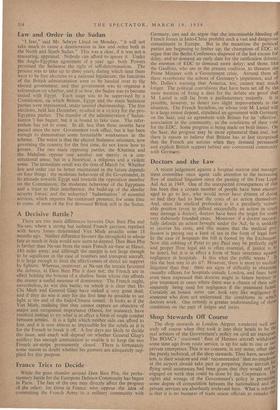"I fear," said Mr. Selwyn Lloyd on Monday, " it
will not take much to cause a deterioration in law and order both in the North and South Sudan." This was a clear, if it was not a reassuring, appraisal. Nobody can afford to ignore it. Under the Anglo-Egyptian agreement of a year ago both Powers promised the Sudanese the right of self-determination. The process was to take up to three years, during which time there were to be free elections to a national legislature; the functions of the British administration were to be handed over to the elected government; and that government was to organise a referendum on whether, and if so how, the Sudan was to become united with Egypt. Each stage was to be supervised by a Commission, on which Britain, Egypt and the main Sudanese parties were represented, under neutral chairmanship. The free elections, held last December, resulted in a victory for the pro- Egyptian parties. The transfer of the administration (` Sudan- isation ') has begun; but it is .bound to take time. The, refer- endum has yet to come. In all, less than three months have passed since the new Government took office, but it has been enough to demonstrate some formidable weaknesses in the scheme. The worst is that the elected Sudanese ministers, now governing, the country for the first time, do not know how to govern. The two main opposing parties, the Khatmia and the Mandists oppose one another not merely in a con- stitutional sense, but in a historical, a religious and a violent sense. The immediate result was the riots of March 1st. Whether law and order can be better maintained in the future depends on four things : the moderate behaviour of the Government, in its attitude towards Egypt and towards the opposition member on the Commission; the moderate behaviour of the Egyptians and a truce to their interference: the build-up of the slender security forces; and the unhurried Sudanisation ' of essential services, which requires the continued presence, for some time to come, of most Of the five thousand British still in the Sudan.


































 Previous page
Previous page